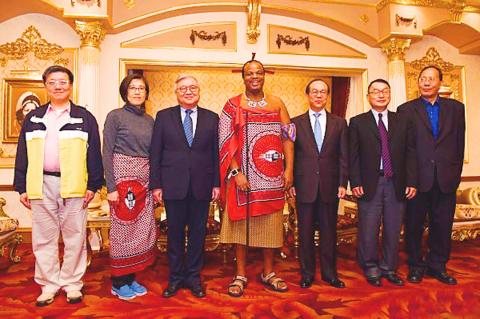Ambassador to Eswatini Thomas Chen (陳經銓) has made significant progress in his recovery from a stroke late last month, Ministry of Foreign Affairs spokesman Andrew Lee (李憲章) told a media briefing yesterday.
After being found seriously ill in his Mbabane office on June 22, Chen was transferred to a hospital in South Africa for treatment.
He returned to Eswatini on June 29 and remains hospitalized.

Photo: Lu I-hsuan, Taipei Times
Chen has regained full consciousness and is able to communicate with medical professionals and his family, Lee said.
Chen is the only remaining Taiwanese ambassador in Africa after Burkina Faso severed ties with Taiwan in late May.
As Eswatini is Taiwan’s last African ally, Chen was busy arranging King Mswati III’s state visit to Taiwan on June 6 and President Tsai Ing-wen’s (蔡英文) trip to Eswatini in April before he became ill.
Chen is not the first Taiwanese envoy to feel pressure to shore up Taiwanese diplomatic relations in the face of Beijing’s aggressive measures to entice African countries with investment and loans before the Forum on China-Africa Cooperation (FOCAC) scheduled to take place in Beijing in September.
The ministry previously revealed that then-ambassador to the Dominican Republic Tang Ji-zen (湯繼仁) lost 7kg and was under extreme pressure before China persuaded the Caribbean nation to establish formal ties with Beijing on April 30.
In an interview with CNN at the end of last month, Chen said that he does not lose any sleep over the Taiwan-Eswatini relationship.
King Mswati III has told Taipei that he does not plan to attend the China-Africa summit and reiterated his country’s commitment to Taiwan during his visit, promising to be a friend in “good times and bad times.”
Chen has served as the ambassador to the southern African nation, previously known as Swaziland, since September 2013.

TRAFFIC SAFETY RULES: A positive result in a drug test would result in a two-year license suspension for the driver and vehicle, and a fine of up to NT$180,000 The Ministry of Transportation and Communications is to authorize police to conduct roadside saliva tests by the end of the year to deter people from driving while under the influence of narcotics, it said yesterday. The ministry last month unveiled a draft of amended regulations governing traffic safety rules and penalties, which included provisions empowering police to conduct mandatory saliva tests on drivers. While currently rules authorize police to use oral fluid testing kits for signs of drug use, they do not establish penalties for noncompliance or operating procedures for officers to follow, the ministry said. The proposed changes to the regulations require

The Executive Yuan yesterday announced that registration for a one-time universal NT$10,000 cash handout to help people in Taiwan survive US tariffs and inflation would start on Nov. 5, with payouts available as early as Nov. 12. Who is eligible for the handout? Registered Taiwanese nationals are eligible, including those born in Taiwan before April 30 next year with a birth certificate. Non-registered nationals with residence permits, foreign permanent residents and foreign spouses of Taiwanese citizens with residence permits also qualify for the handouts. For people who meet the eligibility requirements, but passed away between yesterday and April 30 next year, surviving family members

Taipei, New Taipei City, Keelung and Taoyuan would issue a decision at 8pm on whether to cancel work and school tomorrow due to forecasted heavy rain, Keelung Mayor Hsieh Kuo-liang (謝國樑) said today. Hsieh told reporters that absent some pressing reason, the four northern cities would announce the decision jointly at 8pm. Keelung is expected to receive between 300mm and 490mm of rain in the period from 2pm today through 2pm tomorrow, Central Weather Administration data showed. Keelung City Government regulations stipulate that school and work can be canceled if rain totals in mountainous or low-elevation areas are forecast to exceed 350mm in

China Airlines Ltd (CAL) yesterday morning joined SkyTeam’s Aviation Challenge for the fourth time, operating a demonstration flight for “net zero carbon emissions” from Taiwan Taoyuan International Airport to Bangkok. The flight used sustainable aviation fuel (SAF) at a ratio of up to 40 percent, the highest proportion CAL has achieved to date, the nation’s largest carrier said. Since April, SAF has become available to Taiwanese international carriers at Taipei International Airport (Songshan airport), Kaohsiung International Airport and Taoyuan airport. In previous challenges, CAL operated “net zero carbon emission flights” to Singapore and Japan. At a ceremony at Taoyuan airport, China Airlines chief sustainability